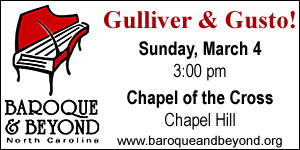As an alternative to the usual European Christmas carol fare, this year Voices (formerly the Chapel Hill Community Chorus) offered “A New World Christmas.” The program feature selections from the Latin American and Caribbean traditions as well as numbers inspired by this tradition, but composed by Anglos.
Voices began its existence in 1980 as the Chapel Hill-Carrboro Community Chorus, later renamed the Chapel Hill Community Chorus and, this year, simply Voices (or Voices – The Chapel Hill Chorus, as printed in the 2011-12 season program). Voices also includes Cantari, a hand-picked ensemble that sings mostly a capella selections. The energetic but always seemingly relaxed Sue Klausmeyer, director since 2000, is known for her eclectic programming, including great classics to jazz to gospel. This time she has outdone herself with a program of sparkling delights including a variety of special accompaniments, a superb tenor soloist, a very fine children’s choir, and more.
The opening selection was Ariel Ramirez’s 1964 composition, Missa Criolla, featuring tenor Timothy Sparks and guitarist Joseph Pecoraro. The music is a setting of the ordinary of the mass in a Castilian text, combining South American folk music, particularly the rhythms and melodies of Ramirez’s native Argentina. The choir wrapped itself around the lively rhythms and was movingly effective with the sensitive and at times mystical choral meditations. Sparks soared with his clear, clean tenor voice, and Pecoraro provide the essential guitar with panache.
The exquisitely beautiful lullaby “A la Nanita Nana,” a traditional tune arranged by Dan Davison featured the men of the chorus and was accompanied by two violins and guitar. It was just flat-out gorgeous.
“Los Reys De Oriente” (The Kings from the East), a traditional carol arranged by Edward Henderson, featured Sparks. This piece, in a different arrangement, is on one of the first Christmas Lps in my collection. It brought me back home and was a delight to hear in this arrangement.
The next two selections were also arranged by Henderson. The chorus clearly had fun with the neat arrangement of “Fum, Fum, Fum,” and brought heaven down close to earth with the mystical “El Cielo Canta Alegria.” The program continued with the familiar “The Virgin Mary had a Baby Boy” which featured Deborah Hollis and Leslie Wickham in a four-hand piano accompaniment.
The outstanding Creekside Chorus joined Voices for the next two selections; “Calypso Carol” by Michael Perry arranged by Allen Pote, and “¡Cantar!” by Jay Althouse. The children’s voices were clear and strong and added a very special touch to this concert. In “Calypso Carol,” we also got our first taste of the steel drum, but more about that later.
The first half of the program was brought to a close with three pieces sung by Cantari. First was “Alleluia,” from Brazilian Psalm by Jean Berger; a tour de force of choral singing. Next we heard the lively “Go Tell It on the Mountain,” arranged by Donald McCullough, with a solo winsomely in the mountain style by Amanda Haas. An interesting arrangement of “Silent Night” by César Alejandro Carrillo brought us to intermission. Cantari sings with confidence, precision, and fine- tuned vocal quality.
The second half of the concert began with Guadalupe Magnificat by Glenn McClure, professor at Eastman School of Music. The work is a Caribbean setting of the Canticle of the Blessed Virgin Mary from Luke 1:46-55. Set in four sections, it is scored for soloist, chorus, steel drum, piano, and drum set and includes lively and infectious rhythms as well as reflective choral and solo passages. The steel drum plays a major role. For those not familiar with the unique instrument, originating in Trinidad, it was originally made out of used oil drums. They are now more often made of sheet metal 0.8 mm to 1.5 mm in thickness. The side of the instrument, called the skirt, determines the depth of sound. In the floor of the pan specific areas are tuned on the basis of the circle of fifths (C-G-D-A etc.) by raising the area. A tenor or lead steel drum (or pan) contains an octave plus six of chromatic tones. The sound is haunting and memorable, somewhat akin to combination of a kitchen pan, a marimba, and a cowbell, but mellower. Brian Malone is currently assistant principal percussionist with the Kentucky Symphony Orchestra, director of Over-the-Rhine Steel Drum Band, and a performer with the Bacchanal Steel Band, a four-piece ensemble. In the lively “Suscepit Israel” section of the Guadalupe Magnificat, at the request of Klausmeyer, he played an extensive solo improvisation that brought extended applause and cheers from the audience. It was throughout the piece an impressive performance by Malone. Sparks added his powerful and well-tempered tenor along with the drum set and Hollis’s always steady piano.
The concert closed with a lovely and inspiring rendition of “The Light Will Come” by David Angerman and Joseph Martin. Creekside Chorus joined Voices for this stirring conclusion to an extraordinary and pleasing concert. The chorus, soloist, and all the accompanying instruments were sensational.
A final performance is scheduled for 8:00 p.m. December 17 at Hill Hall. See the sidebar for details and go early, to get a seat!











